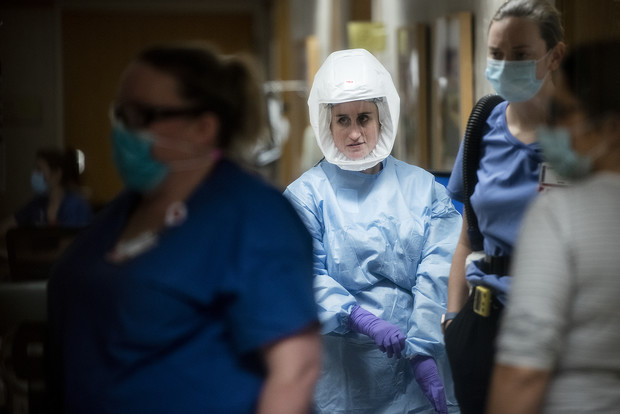State Health Officials Await Data On Omicron
Monitoring the emergence of new COVID-19 variant as state hits 11-month high in cases.

Nurses and doctors at UW Hospital walk through a hallway Tuesday, Nov. 17, 2020, in one of the hospital’s COVID-19 units, where patients are treated for the disease. Angela Major/WPR
Wisconsin health officials say they’re monitoring the emergence of a new COVID-19 variant called omicron as they continue to deal with a surge in new cases spurred by the virus’s delta variant.
On Friday, the World Health Organization announced a new COVID-19 variant had been identified in South Africa, which has been designated a “variant of concern” by the group.
As of Sunday, the omicron variant has been identified by researchers in Botswana, the United Kingdom, Italy, Germany, Belgium, Israel, the Netherlands, Australia, Hong Kong and Canada.
Dr. Anthony Fauci, the director of the National Institute of Allergy and Infectious Diseases, said Sunday the U.S. Centers for Disease Control and Prevention hasn’t announced any cases in the U.S., but said, “inevitably, it will be here.”
President Joe Biden was briefed on omicron on Sunday by medical advisors including Fauci. During a Monday press conference, Biden urged calm and said the best protection against the variant is getting fully vaccinated and getting a booster shot.
“This variant is a cause for concern, not a cause for panic,” said Biden. “We have the best vaccines in the world and the best medicines, the best scientists, and we’re learning more every single day. And we’ll fight this variant with scientific and knowledgeable actions and speed, not chaos and confusion.”
That’s the most hospitalizations reported since Dec. 21, 2020. On Dec. 1, 2020, there were 415 COVID-19 patients in the ICU.
Wisconsin Hospital Association President Eric Borgerding said member institutions are busy with a combination of new coronavirus related illnesses and regular hospital visits, which are up compared to last fall.
“It has not let go of Wisconsin, and that shows up in various sorts of statistics,” said Borgerding.
He said at the same time, hospitals are tending to hundreds of COVID-19 patients from nursing homes who could be discharged but aren’t being accepted by the facilities they live at. Borgerding said that is exacerbating space and staffing challenges.
Dr. Nasia Safdar, the director of infection control at UW Hospitals and Clinics, said she and other health care experts are wondering whether the omicron variant will be more contagious, how serious infections will be and how effective current vaccines will be in combating it. Safdar said it’s important to remember that even if existing vaccines are less effective on this new strain, they are still likely to offer some protection.
“Every decision that we make in this pandemic is going to be a trade-off between the risk and the benefit, and it’s what can one do to mitigate that risk,” said Safdar. “And of course, we don’t know how this is going to unfold fully yet. But it is a reminder that let’s do everything that we can on our end to mitigate things.”
Safdar said that means getting vaccinated, getting booster shots and wearing masks when attending crowded, indoor events.
Listen to the WPR report here.
Wisconsin health officials waiting for more data on omicron coronavirus variant was originally published by Wisconsin Public Radio.
If you think stories like this are important, become a member of Urban Milwaukee and help support real, independent journalism. Plus you get some cool added benefits.
More about the Coronavirus Pandemic
- Governors Tony Evers, JB Pritzker, Tim Walz, and Gretchen Whitmer Issue a Joint Statement Concerning Reports that Donald Trump Gave Russian Dictator Putin American COVID-19 Supplies - Gov. Tony Evers - Oct 11th, 2024
- MHD Release: Milwaukee Health Department Launches COVID-19 Wastewater Testing Dashboard - City of Milwaukee Health Department - Jan 23rd, 2024
- Milwaukee County Announces New Policies Related to COVID-19 Pandemic - County Executive David Crowley - May 9th, 2023
- DHS Details End of Emergency COVID-19 Response - Wisconsin Department of Health Services - Apr 26th, 2023
- Milwaukee Health Department Announces Upcoming Changes to COVID-19 Services - City of Milwaukee Health Department - Mar 17th, 2023
- Fitzgerald Applauds Passage of COVID-19 Origin Act - U.S. Rep. Scott Fitzgerald - Mar 10th, 2023
- DHS Expands Free COVID-19 Testing Program - Wisconsin Department of Health Services - Feb 10th, 2023
- MKE County: COVID-19 Hospitalizations Rising - Graham Kilmer - Jan 16th, 2023
- Not Enough Getting Bivalent Booster Shots, State Health Officials Warn - Gaby Vinick - Dec 26th, 2022
- Nearly All Wisconsinites Age 6 Months and Older Now Eligible for Updated COVID-19 Vaccine - Wisconsin Department of Health Services - Dec 15th, 2022
Read more about Coronavirus Pandemic here



















